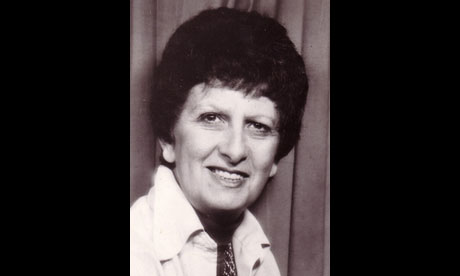
Wendy Greengross, who has died aged 87, was a pioneering counsellor, agony aunt and author of empowering publications about sexuality, ageing and disability. Always eloquent, she had a passion for her subject and an accessible style that led to broadcasting success.
In the early 1970s, Wendy joined the innovative Radio 4 counselling programme If You Think You've Got Problems, which ran on Sunday evenings for nearly eight years. She hosted her own short-lived show, Let's Talk it Over, on BBC1 in 1973 and was an adviser on the soap opera Crossroads (it was Wendy who suggested that the character Sandy should use a wheelchair after suffering an accident). In 1972 she began a weekly column, Heart to Heart with Doctor Wendy, in the Sun, staying for four years until she felt the letters passed to her were more about titillation than education.
She was born in Brent Cross, north London, to Morris and Miriam Greengross. Her father, a jeweller, was given the first tools of his trade by the Jewish Board of Guardians, which later became the welfare agency Jewish Care, one of many organisations with which Wendy worked. He was a councillor, alderman and mayor in Holborn, setting an example of public service that would become central to Wendy's life.
In 1936 she started at South Hampstead high school. During the second world war she was evacuated with the school to Berkhamsted in Hertfordshire. She was keen to pursue a medical career, but at the time only a few of London's medical schools accepted women and a strict quota system existed. Nevertheless, in 1943 Wendy was offered a place at University College hospital. She qualified in 1949 and was awarded a Fulbright scholarship to the Chicago Lying-in hospital. While doing locum work before she left for the US, she met Alex Kates, a surgeon. Normally the most cautious of men, after a week he asked her to marry him, and the wedding took place seven months later, in 1951. By 1959 they had five children.
Wendy was determined to better the lives of the disadvantaged and her ideas were often years ahead of their time. She and her husband took over a large general practice in Tottenham, north London, which also offered family planning. Soon it became the first practice in the UK to employ a marriage guidance counsellor. Wendy continued to work as a GP for almost 35 years, drawing on her clinical experience for many of her ideas.
Having trained as a counsellor with the Marriage Guidance Council (now Relate), her work with the Association of Jewish Youth led her into the area of sex education and her first two publications, Sex in the Middle Years (1969) and Sex in Early Marriage (1970). Both attracted notoriety and success, since she was unequivocal – scandalously so for the time – that women enjoyed sex and continued to do so into later life, and that married women were entitled to sexual pleasure. Drawing on case histories of women she had treated, Wendy challenged the traditional view that women put up with sex for their husband's sake.
She sustained this theme of empowerment with Entitled to Love – The Sexual and Emotional Needs of the Handicapped (1976) and Sex and the Handicapped Child (1980). She argued, again controversially for the time, that people with disabilities were still sexual beings and should be respected as such. She also argued that parents needed to come to terms with their children attaining sexual maturity, even in the face of mental or physical difficulties. In 1972 she became a founder member of Sexual Problems of the Disabled, which she later chaired.
Ill health and Alex's death in 1982 might have led Wendy to slow down. Instead she joined the Warnock committee, examining human fertilisation and embryology. She also had a key role in a pastoral care programme for rabbinical students at Leo Baeck College in London. Rabbi Tony Bayfield described her as one of the most important postwar figures in the Jewish reform movement. In 1985 the Reform Synagogue of Great Britain published her pioneering booklet Jewish and Homosexual, in which she wrote: "It is easy to identify underprivileged groups who need charity. It is more difficult to identify the groups that need compassion and meet their needs, for we often assume, wrongly, that their troubles are of their own making, and as a result withdraw the emotional support that they require."
Wendy was involved in the creation of Raphael, the Jewish counselling service, joined a working party on the future of the family and was a board member and regular contributor to the magazine Manna, published by the Movement for Reform Judaism. In 1991, with her sister-in-law, Sally Greengross, she wrote Living, Loving and Ageing. She served as a trustee of the Leonard Cheshire Foundation (now Leonard Cheshire Disability), where she remained for 25 years and was a vice-president at the time of her death.
Wendy is survived by her daughters, Hilary and Polly, sons Nick and Richard, and three grandchildren. Her son Trevor died in 1997.
• Wendy Greengross, doctor, counsellor and author, born 25 April 1925; died 10 October 2012

